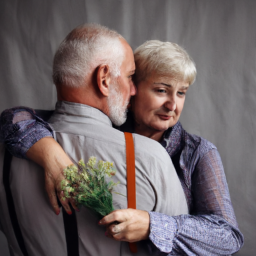Marriage and aging are two inevitable aspects of life that often intersect, shaping the experiences and perspectives of individuals as they navigate the journey of growing older together. As time passes, the dynamics within a marriage evolve, influenced by various factors such as children, career changes, and societal expectations. In this blog post, we will explore the intricate relationship between marriage and aging, delving into the challenges, rewards, and unique dynamics that arise as couples navigate the complexities of aging together. Whether you are embarking on this journey or simply curious about the topic, join us as we delve into the profound impact that marriage and aging can have on individuals and their relationships.
The Impact of Marriage on Aging: Exploring the Benefits and Challenges
Marriage is a significant milestone in one’s life, and as we age, it can have a profound impact on our overall well-being. In this article, we will delve into the benefits and challenges that marriage brings as we navigate the journey of aging. By understanding the dynamics of marriage and aging, we can better appreciate the importance of nurturing our relationships and maintaining a healthy partnership throughout the years.
The Benefits of Marriage in the Aging Process
1. Emotional Support: One of the most significant advantages of being married while aging is the emotional support that a spouse can provide. As we grow older, we may face various challenges such as health issues, loss of loved ones, and retirement. Having a life partner by our side during these difficult times can offer a sense of comfort, companionship, and understanding. Research has shown that married individuals tend to experience lower rates of depression and loneliness compared to their unmarried counterparts.
2. Physical Health: Marriage has also been linked to better physical health outcomes in older adults. Having a supportive spouse can encourage healthier lifestyle choices, such as regular exercise, a balanced diet, and avoidance of harmful habits. Moreover, married individuals often have someone who can help monitor their health, remind them of medical appointments, and provide assistance during times of illness or recovery. This support system can contribute to improved overall health and a higher quality of life.
3. Cognitive Function: Studies have indicated that being married may have a positive impact on cognitive function as we age. Engaging in stimulating conversations, problem-solving together, and participating in shared activities can help keep our minds sharp and active. Furthermore, having a partner who can provide mental stimulation and intellectual companionship can reduce the risk of cognitive decline and conditions like dementia.
Challenges Faced in Marriage and Aging
1. Adjusting to Change: Aging brings about various changes, both physical and emotional, which can sometimes strain a marriage. As individuals age, they may experience health issues, reduced mobility, or changes in their appearance. These changes can affect self-esteem and may require both partners to adapt to new circumstances. Open communication, empathy, and a willingness to embrace change are essential in navigating these challenges together.
2. Financial Considerations: With aging often comes retirement, and financial matters can become a significant concern for married couples. Planning for retirement, managing savings, and ensuring a stable financial future can create stress within a marriage. It is crucial for couples to have open discussions about their financial goals, develop a budget, and explore retirement options to alleviate potential conflicts and uncertainties.
3. Loss and Grief: As we age, we may experience the loss of friends, family members, or even our spouse. Coping with grief and navigating the emotional aftermath of loss can be particularly challenging in a marriage. It is important for couples to support each other during these difficult times, seek professional help if needed, and find healthy ways to grieve and heal together.
Nurturing a Healthy Marriage as We Age
1. Communication is Key: Effective communication is vital in any marriage, but it becomes even more crucial as we age. Regularly check in with your partner, express your needs and concerns, and actively listen to their thoughts and feelings. Clear and open communication can help resolve conflicts, strengthen the bond between partners, and foster a deeper understanding of each other’s needs and desires.
2. Quality Time Together: Amid the busyness of life, it is essential to set aside quality time for each other. Engage in shared activities, plan date nights, and create opportunities for laughter and joy. Spending quality time together allows couples to reconnect, create new memories, and maintain a strong emotional connection as they age.
3. Seek Support: Sometimes, seeking support from professionals or joining support groups can be beneficial for a marriage. Marriage counseling or therapy can provide a safe space to address any underlying issues, improve communication skills, and strengthen the marital bond. Additionally, connecting with other couples who are navigating similar challenges can offer a sense of community and understanding.
In conclusion, marriage can greatly influence the aging process, both positively and with its own set of challenges. The emotional support, physical health benefits, and cognitive stimulation that marriage provides can significantly enhance our overall well-being as we age. However, it is important to acknowledge and address the challenges that may arise, such as adjusting to change, financial considerations, and coping with loss and grief. By nurturing a healthy marriage through effective communication, spending quality time together, and seeking support when needed, couples can navigate the journey of aging hand in hand, ensuring a fulfilling and rewarding partnership.

Strategies for Maintaining a Healthy Marriage in Older Age
In today’s society, marriage is an institution that is constantly evolving. As individuals age, the dynamics of their relationships also change. It is important for couples to adapt and find strategies to maintain a healthy and fulfilling marriage in older age. In this article, we will explore some effective strategies that can help couples navigate the challenges and enjoy a thriving relationship as they grow older together.
1. Effective Communication
Communication is the foundation of any successful relationship, and this holds true for marriages as well. As couples age, it becomes even more crucial to maintain open and honest lines of communication. Regularly expressing thoughts, feelings, and concerns can help prevent misunderstandings and build trust.
One effective communication strategy is active listening. This involves giving your partner your undivided attention, maintaining eye contact, and truly listening to what they have to say. Avoid interrupting or formulating your response while they are speaking. Instead, focus on understanding their perspective and validating their feelings.
Another important aspect of communication is expressing gratitude and appreciation. As we age, it is easy to take our partners for granted. By regularly acknowledging and thanking them for their contributions, both big and small, we can foster a sense of mutual respect and strengthen the bond between us.
2. Prioritize Quality Time Together
In the hustle and bustle of everyday life, it is easy for couples to get caught up in their individual routines and responsibilities. However, making time for each other and prioritizing quality time together is essential for maintaining a healthy marriage in older age.
One effective strategy is to establish regular date nights. Whether it’s going out for a romantic dinner, taking a leisurely walk in the park, or simply enjoying a movie night at home, carving out dedicated time for each other allows couples to reconnect and nurture their emotional connection.
Additionally, engaging in shared activities and hobbies can help strengthen the bond between partners. This could involve anything from cooking together, taking dance classes, or even embarking on new adventures like traveling or learning a new language. These shared experiences create lasting memories and provide opportunities for growth and exploration as a couple.
3. Embrace Change and Adaptability
As couples age, it is inevitable that both individuals will experience physical, emotional, and mental changes. Embracing these changes and being adaptable is crucial for maintaining a healthy marriage.
One important aspect of adaptability is being supportive of each other’s individual growth and development. Encourage and celebrate your partner’s personal achievements and aspirations. This could include pursuing new hobbies, furthering education, or even starting a new career. By supporting each other’s individual journeys, couples can continue to grow together and maintain a sense of fulfillment.
Another aspect of adaptability is being open to renegotiating roles and responsibilities within the relationship. As physical abilities change, it may be necessary to redistribute household tasks or seek outside assistance. By being flexible and willing to adapt to new circumstances, couples can alleviate stress and maintain a harmonious balance in their marriage.
In conclusion, maintaining a healthy marriage in older age requires effort, understanding, and a willingness to adapt. Effective communication, prioritizing quality time together, and embracing change are essential strategies for nurturing a thriving relationship. By implementing these strategies, couples can navigate the challenges of aging together and enjoy a fulfilling and loving partnership.

As we grow older, our relationships undergo various transformations, and marriage is no exception. Aging brings about physical, emotional, and psychological changes that can impact the dynamics of a marriage. Navigating these changes requires understanding, adaptability, and effective communication. In this article, we will explore the challenges and opportunities that arise in marriage as we age, and provide you with a step-by-step guide to maintaining a fulfilling and harmonious relationship.
1. Embracing Physical Changes
One of the most noticeable changes that come with aging is the physical transformation of our bodies. Wrinkles, gray hair, and a slower pace of life can sometimes lead to feelings of insecurity and self-doubt. It is essential to approach these changes with acceptance and love. Remember that beauty lies beyond the external appearance, and true intimacy is built on a deep emotional connection.
Communication plays a vital role in navigating physical changes. Ensure that you and your partner openly discuss any concerns or insecurities you may have. Expressing your feelings and offering reassurance can foster a sense of understanding and support. Additionally, explore new ways to maintain a healthy lifestyle together, such as engaging in regular physical activity or trying out new hobbies. These shared experiences can strengthen your bond and promote overall well-being.
Furthermore, it is important to prioritize self-care. Taking care of your physical and mental health will not only benefit you but also your marriage. Engage in activities that bring you joy and help you feel confident. Remember, a happy and fulfilled individual contributes to a happy and fulfilled relationship.
2. Nurturing Emotional Connection
Emotional intimacy is the cornerstone of a successful marriage, and it becomes even more crucial as we age. Life experiences, both positive and negative, accumulate over time, shaping our perspectives and emotions. To navigate the changes in intimacy, it is essential to nurture emotional connection with your partner.
Engage in active listening and empathy. Take the time to truly understand your partner’s thoughts, feelings, and concerns. Create a safe space where both of you can openly express yourselves without fear of judgment. Regularly check in with each other to ensure that you are meeting each other’s emotional needs.
Additionally, embrace the power of gratitude and appreciation. Expressing gratitude for your partner’s presence, support, and love can strengthen the emotional bond between you. Celebrate each other’s accomplishments and milestones, no matter how small they may seem. Remember, acknowledging and valuing each other’s contributions fosters a sense of love and belonging.
Finally, prioritize quality time together. In the hustle and bustle of daily life, it is easy to get caught up in responsibilities and obligations. However, setting aside dedicated time for each other is crucial for maintaining emotional intimacy. Engage in activities that you both enjoy, whether it’s going for a walk, cooking together, or simply having heartfelt conversations. These moments of connection will help you navigate the changes in intimacy and keep your relationship strong.
3. Effective Communication Strategies
Communication is the lifeline of any relationship, and it becomes even more vital as we age. Effective communication strategies can help navigate the changes and challenges that arise in marriage. Here are some steps you can take:
Step 1: Active Listening
Practice active listening by giving your full attention to your partner when they are speaking. Avoid interrupting or formulating your response while they are still talking. Validate their feelings and thoughts, even if you disagree. This creates a safe and respectful environment for open communication.
Step 2: Use “I” Statements
When expressing concerns or discussing sensitive topics, use “I” statements instead of “you” statements. For example, say “I feel hurt when…” instead of “You always make me feel hurt when…”. This approach helps to avoid blame and encourages constructive dialogue.
Step 3: Seek Professional Help if Needed
If communication challenges persist or become overwhelming, do not hesitate to seek professional help. Marriage counselors or therapists can provide valuable guidance and support in navigating the changes in intimacy and communication.
Remember, effective communication is a continuous process that requires effort from both partners. By actively listening, using “I” statements, and seeking professional help if needed, you can strengthen your communication skills and overcome any obstacles that may arise.
In conclusion, marriage and aging bring about changes in intimacy and communication. Embracing physical changes, nurturing emotional connection, and employing effective communication strategies are essential steps in navigating these changes. By prioritizing understanding, adaptability, and love, you can maintain a fulfilling and harmonious relationship throughout the journey of aging together.
Let’s recap
Marriage and aging are two significant aspects of life that often intertwine and impact each other in various ways. As individuals age, the dynamics of their marital relationship may undergo significant changes, presenting both challenges and opportunities. While aging can bring about physical and emotional transformations, it can also deepen the bond between spouses and lead to a more fulfilling and resilient marriage.
As couples grow older, they may face unique challenges that require adaptability and understanding. Physical health issues, such as chronic illnesses or mobility limitations, can impact the overall well-being of both partners and require adjustments in daily routines and lifestyles. Emotional changes, such as mood swings or cognitive decline, may also influence the dynamics of the relationship, demanding patience and empathy from both spouses. However, aging can also provide an opportunity for couples to strengthen their bond through shared experiences and a deeper understanding of each other’s needs. With time, married partners may develop a stronger sense of companionship and emotional support, which can contribute to greater marital satisfaction and overall happiness in later years.
In conclusion, marriage and aging are interconnected phenomena that can shape and transform each other. While aging may present challenges to a marital relationship, it also offers the potential for growth, resilience, and a more profound connection between spouses. By embracing the changes that come with age and cultivating understanding and support, couples can navigate the journey of aging together, fostering a fulfilling and enduring marriage.
FAQ Roundup:
Q1: How does marriage affect the aging process?
A1: Marriage can have a significant impact on the aging process. Research suggests that married individuals tend to live longer and have better overall health compared to their unmarried counterparts. The emotional support, companionship, and social engagement that come with a successful marriage can contribute to reduced stress levels, increased happiness, and improved mental well-being. Moreover, married couples often encourage healthier habits, such as regular exercise and a balanced diet, which can positively influence the aging process.
A2: While marriage cannot guarantee immunity from age-related diseases, studies have shown that being married can potentially delay their onset. The emotional and practical support provided by a spouse can help individuals cope with stress and adversity, which can in turn reduce the risk of developing certain health conditions. Additionally, married couples are more likely to encourage each other to seek timely medical care, leading to early detection and treatment of age-related diseases.
Q3: How does marriage impact cognitive health in old age?
A3: Marriage has been linked to better cognitive health in old age. The constant mental stimulation and social interaction that come with a fulfilling marriage can help preserve cognitive function and reduce the risk of cognitive decline. Engaging in meaningful conversations, participating in activities together, and sharing experiences can all contribute to keeping the brain active and healthy as one ages.
Q4: Does the quality of marriage matter in relation to aging?
A4: Yes, the quality of marriage plays a crucial role in relation to aging. Research indicates that individuals in happy and supportive marriages tend to experience greater health benefits as they age compared to those in unhappy or conflict-ridden marriages. A positive marital relationship fosters emotional well-being, reduces stress, and promotes healthy habits, all of which can contribute to better aging outcomes.
Q5: Can marriage provide emotional support during the challenges of aging?
A5: Absolutely. Marriage can serve as a vital source of emotional support during the challenges of aging. Having a loving and understanding spouse by your side can help alleviate feelings of loneliness, anxiety, and depression that may arise with age. Sharing life’s ups and downs with a supportive partner can provide comfort, encouragement, and a sense of security, ultimately enhancing emotional well-being during the aging process.

About Sarah:
Sarah is a certified marriage counselor and co-founder of SaveOurVows.com. Her expertise lies in helping couples reignite the spark in their relationships and create a lasting bond built on trust and understanding. As a devoted wife and mother, Sarah draws from her personal experiences and professional training to offer valuable guidance to couples seeking to save their marriages. Her articles focus on nurturing emotional connection and fostering a supportive environment where love can thrive.
About John:
John is a relationship expert and co-founder of SaveOurVows.com. With a Master’s degree in Marriage and Family Therapy, John is passionate about helping couples navigate the challenges that come with marriage. Having experienced the highs and lows in his own relationship with Sarah, he understands the complexities of married life and believes in the power of effective communication and emotional intimacy. John’s articles offer practical tips and insights to empower couples in their journey to a stronger and more fulfilling marriage.
Together as a Team:
John and Sarah’s mission is to provide a compassionate and supportive platform for couples in need of guidance and encouragement. Through their collaborative efforts, they aim to inspire love and commitment in marriages worldwide. As a couple themselves, they embody the principles they teach, and their dedication to helping others strengthen their relationships is the driving force behind SaveOurVows.com.
Favorite Topics:
Rekindling Romance: John and Sarah believe that rekindling the romance is an essential aspect of any successful marriage. Their articles on this topic offer creative ideas and practical strategies to keep the passion alive.
Effective Communication: Communication is the foundation of a healthy relationship. John and Sarah share expert tips to improve communication between couples and resolve conflicts constructively.
Building Trust: Trust is paramount in any marriage. Through their articles, they help couples rebuild trust and create a secure and loving environment.
Join Sarah and John’s Journey:
Sarah and John invite you to join them on their journey of empowering couples to save their vows and build lasting and fulfilling marriages. Their insights and advice aim to make a positive impact on your relationship, fostering a bond that stands the test of time.






